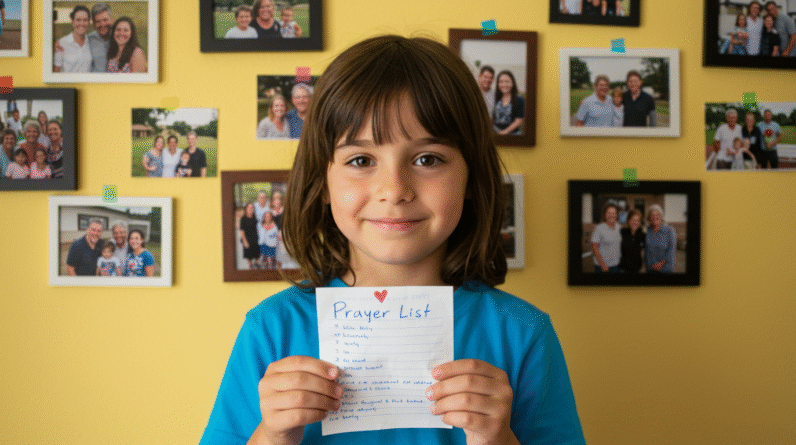Grace-Filled Discipline: Reflecting God’s Love In Your Home
Welcome, dear reader, to a conversation that intertwines the warmth of home with the values of grace and discipline. As you navigate the often complex journey of parenting, you may find yourself seeking a balance between nurturing love and maintaining order. The concept of grace-filled discipline offers a beautiful blueprint, harmonizing these elements and reflecting God’s love in your home. In this article, let’s explore how this approach can transform your parenting journey.
Understanding Grace-Filled Discipline
Grace-filled discipline isn’t about permissiveness or strict control. Instead, it is a compassionate approach to guidance and correction. Grounded in the Christian understanding of grace, it calls for a balance between love, forgiveness, and structure. By integrating grace into the way you correct your child, you demonstrate unconditional love while setting clear boundaries.
Imagine a moment after gentle correction—when emotions have settled and understanding has dawned—a parent reaching out to embrace their child. This act, enveloped in love and forgiveness, parallels the unending grace God extends to us. Paul reminds us of this grace in Ephesians when he writes, “Be kind and compassionate to one another, forgiving each other, just as in Christ God forgave you.” Grace-filled discipline mirrors this divine forgiveness.
The Biblical Foundation of Grace-Filled Discipline
The Bible is replete with teachings on discipline and grace. From Proverbs to the teachings of Jesus, Scripture provides a framework that informs and inspires grace-filled discipline. Consider Proverbs, where wisdom frequently underscores the importance of discipline as an act of love. Proverbs 13:24 insightfully notes, “Whoever spares the rod hates their children, but the one who loves their children is careful to discipline them.” The emphasis here is not on punishment but on the loving correction.
In the New Testament, Jesus exemplifies grace-filled interactions, approaching people with understanding and mercy. He welcomes children, encourages them to come to Him, and gently teaches them what is true and good, reminding us to let children come without fear or coercion. Matthew 19:14 states, “Let the little children come to me, and do not hinder them, for the kingdom of heaven belongs to such as these.”
Implementing Grace-Filled Discipline in Daily Life
Transitioning to grace-filled discipline involves intentional changes that can be both challenging and rewarding. The goal is to create an environment where your child feels safe and loved, even when mistakes are made. Reflecting God’s love means guiding them back to the right path with empathy and patience.
Start with communication. Open dialogue allows your child to express their feelings and thoughts, fostering mutual respect and understanding. Listen actively, ensuring your child feels heard. When you approach to discipline with understanding, your guidance resonates more deeply, helping to form a foundation built on trust.
Respect and empathy are essential when implementing this approach. Consider shared experiences and how they might shape your child’s perception and reaction. Each child is different, and patience is key in discovering the most effective methods for teaching them. Use grace as your guide to invite them into a learning process that engages their minds and hearts.
The Role of Forgiveness in Grace-Filled Discipline
Forgiveness is at the heart of grace-filled discipline. It involves letting go of past mistakes and prioritizing empathy over judgment. When you forgive, you release not only negative emotions but also allow room for healing and growth. This practice of forgiveness, central to the Christian faith, is a powerful element of discipline.
In sharing forgiveness with your child, you mirror the grace that God extends to us. Colossians 3:13 encourages us to, “Bear with each other and forgive one another if any of you has a grievance against someone. Forgive as the Lord forgave you.” By modeling forgiveness, you teach your child compassion and empathy, essential traits for their personal development.
Practical Steps for Integrating Forgiveness
- Apologize when necessary. Taking accountability for your actions or reactions demonstrates humility.
- Encourage reconciliation. After conflicts, guide your child through the process of making amends.
- Use mistakes as teaching moments. Frame mistakes positively, emphasizing the lessons learned rather than the error itself.
By incorporating these practices, you help instill a forgiving spirit within your family, which becomes a cornerstone of grace-filled discipline.

Balancing Discipline with Love
Parents often grapple with the need for discipline while striving to maintain a loving relationship with their children. Finding equilibrium requires introspection and creativity. Grace-filled discipline encourages you to address undesirable behaviors while affirming your unwavering love for your child.
Love accentuates the essence of discipline, ensuring it is an expression of care rather than control. Align your disciplinary methods with expressions of love, such as verbal affirmations, physical affection, or shared activities. Let your child know they are loved, cherished, and worthy, regardless of their mistakes.
Expressing Love Amidst Discipline
- Highlight positive behavior. Before addressing a negative action, acknowledge recent accomplishments or good behavior.
- Reaffirm your love. After correction, reassure your child of your unconditional love.
- Engage in bonding activities. Spend quality time together, reinforcing the understanding that discipline stems from love.
Balancing love with discipline ensures your child understands that guidance is an expression of affection, designed to help them flourish.
Creating a Grace-Filled Environment
A home rooted in grace fosters an atmosphere where children feel understood and valued. This environment nurtures trust, encouraging children to approach difficult situations with openness and honesty. Creating such a space requires mindfulness and commitment to infusing grace into every interaction.
Start by modeling gratitude and compassion. Speak positively, whether discussing daily routines or correcting behavior. Cultivate a habit of expressing gratitude, which can shift perspectives and inspire a culture of appreciation within your family.
Building a Grace-Filled Home
- Practice gratitude together. Share things you are thankful for at meals or bedtime.
- Display patience. Refrain from immediate reactions; pause to consider your response, directing emotions constructively.
- Foster inclusion. Empower your child by involving them in family decisions, reinforcing their place in the family.
Through these practices, your home becomes a sanctuary—a place where grace abounds and love thrives.
Challenges in Adopting Grace-Filled Discipline
Every family faces unique challenges when transitioning to grace-filled discipline. Old habits, societal pressures, and differing temperaments can complicate this transition. Recognizing these challenges is the first step toward overcoming them with grace.
If you struggle with patience or forgiveness, remember that change is a journey, not a destination. Like learning a new skill, it takes continuous practice and perseverance. Feelings of frustration might arise, and that’s okay. Allow grace for yourself as well, acknowledging human imperfection.
Overcoming Common Challenges
- Seek support. Join parenting groups or talk with friends who are on a similar journey.
- Educate yourself. Read books or articles on grace-filled discipline to expand your understanding and toolkit.
- Practice self-care. Ensure you prioritize your well-being to maintain patience and courage.
By addressing challenges with open-mindedness and compassion, you reaffirm your commitment to cultivating a loving and supportive home.
The Long-Term Impact of Grace-Filled Discipline
Incorporating grace-filled discipline not only impacts your present family dynamics but also carries long-term benefits for your child’s personal development. Children raised with grace tend to exhibit empathy, emotional intelligence, and resilience. They are more likely to develop healthy relationships and pursue personal growth grounded in mutual respect and understanding.
At its core, grace-filled discipline equips children with the skills to navigate the complexities of life, emphasizing the importance of forgiveness, understanding, and unconditional love. When faced with adversity, they draw strength from the grace and love modeled in their formative years.
Emphasizing the Lasting Effects
- Develop empathy. Children learn to understand and relate to others’ experiences, fostering deeper, more meaningful connections.
- Cultivate resilience. The ability to overcome difficulties with grace is a key life skill that emerges from a supportive upbringing.
- Encourage lifelong learning. Children embrace mistakes as learning opportunities, not roadblocks, inspired by their upbringing.
Grace-filled discipline is not merely a parenting approach. It is a legacy of love, one that your children may pass on to future generations, creating ripples of change that reflect God’s love in the world.
In conclusion, by embracing grace-filled discipline, you embark on a journey to raise children in an environment that mirrors God’s divine love. This approach nurtures a home where forgiveness, love, and understanding coexist, fostering a secure, nurturing foundation for all. Embrace this journey of growth and discovery, and witness the transformation in both yourself and your family.
Explore More
For further reading and encouragement, check out these posts:
👉 7 Bible Verses About Faith in Hard Times
👉 Job’s Faith: What We Can Learn From His Trials
👉 How To Trust God When Everything Falls Apart
👉 Why God Allows Suffering – A Biblical Perspective
👉 Faith Over Fear: How To Stand Strong In Uncertain Seasons
👉 How To Encourage Someone Struggling With Their Faith
👉 5 Prayers for Strength When You’re Feeling Weak

📘 Jesus and the Woman Caught in Adultery – Grace and Mercy Over Judgement
A powerful retelling of John 8:1-11. This book brings to life the depth of forgiveness, mercy, and God’s unwavering love.
👉 Check it now on Amazon
As a ClickBank Affiliate, I earn from qualifying purchases.
Acknowledgment: All Bible verses referenced in this article were accessed via Bible Gateway (or Bible Hub).
“Want to explore more? Check out our latest post on Why Jesus? and discover the life-changing truth of the Gospel!”








